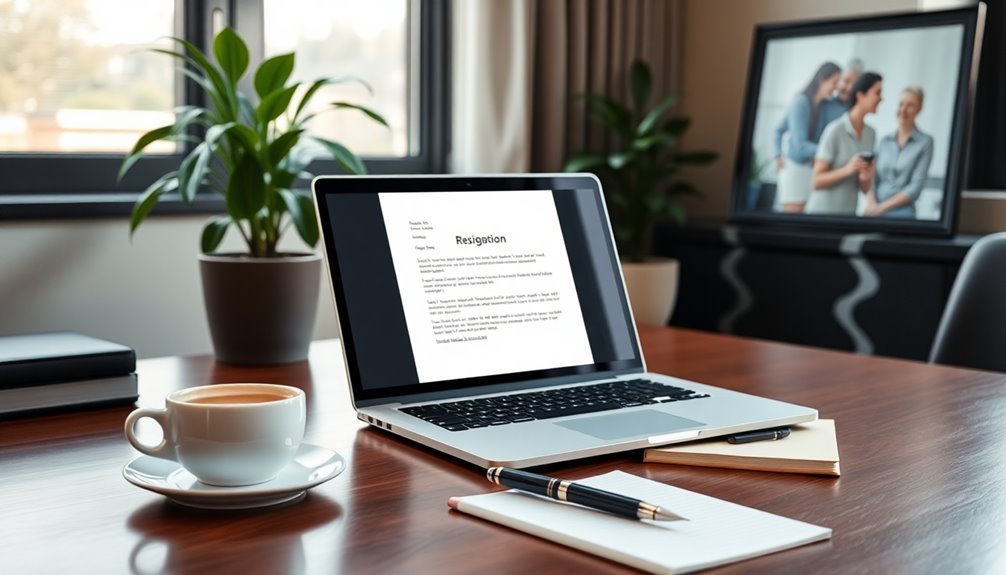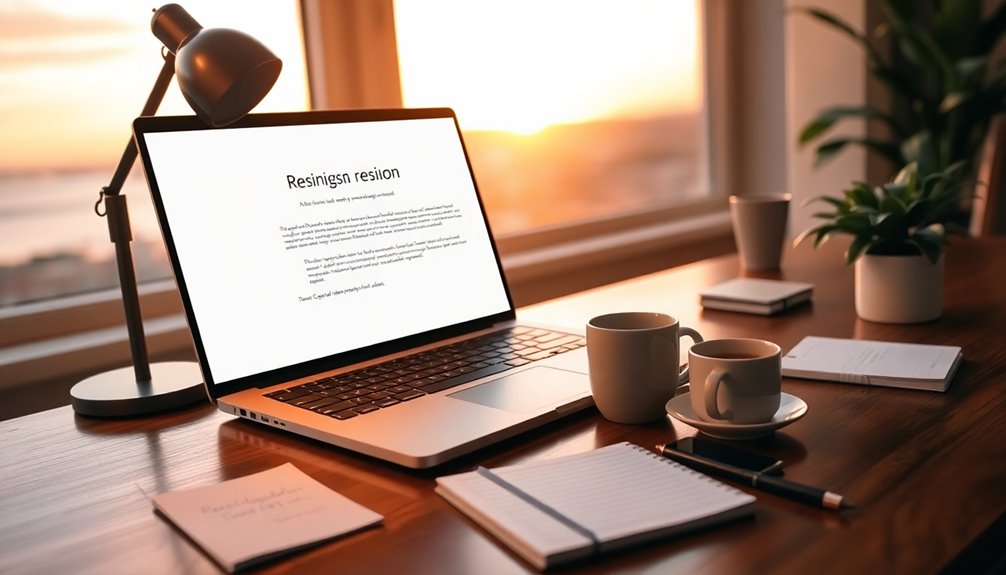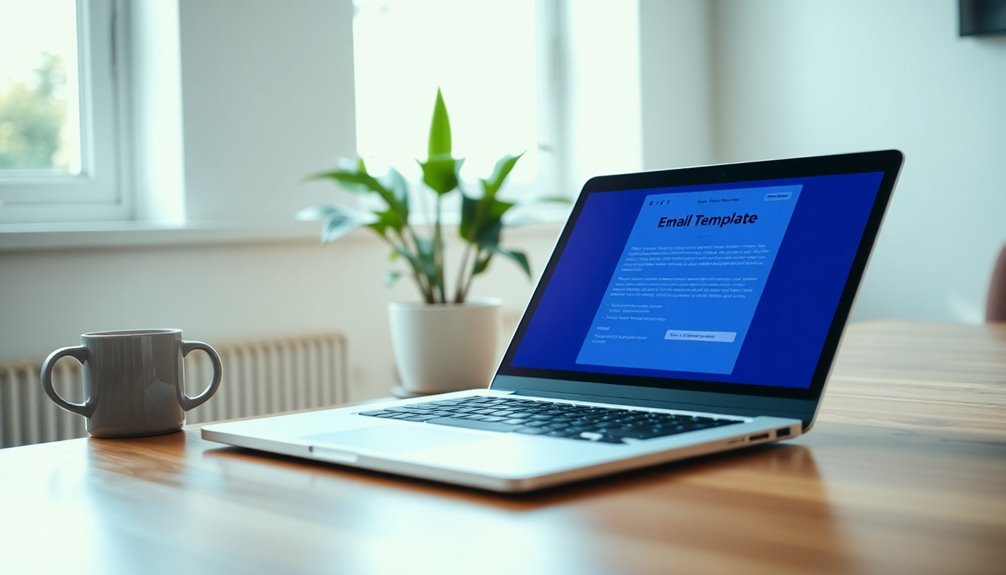To write a resignation email that leaves on good terms, start with a clear subject line like "Resignation – [Your Name]." Begin with a formal greeting and state your intention to resign along with your last working day. Make sure to express gratitude for the opportunities you've had and offer to assist during the transition. Keep the tone positive, avoiding any negative comments about your experience. This approach reinforces professionalism and goodwill, which can benefit your future networking. There are more tips and examples that can guide you in crafting the perfect email to ensure a smooth departure.
Key Takeaways
- Use a clear subject line, such as "Resignation – [Your Name]," to ensure immediate understanding of your email's purpose.
- State your intention to resign and specify your last working day to facilitate transition planning.
- Express sincere gratitude for the support and opportunities received during your tenure.
- Maintain a positive tone throughout the email, avoiding any negative comments or grievances.
- Offer assistance with transition tasks or training to demonstrate professionalism and goodwill.
Introduction

When you decide to leave a job, crafting a resignation email is a crucial step in the process. This email serves as your formal notification of intent to resign, and it typically includes your last working day and any necessary details about your departure. Writing a professional resignation letter not only reflects your commitment to maintaining professionalism but also helps you leave on good terms.
It's standard practice to provide at least two weeks' notice in your resignation email, allowing your employer adequate time to prepare for your exit and manage the transition. During this notice period, you should express gratitude for the opportunities and experiences you've gained while working there. This gesture reinforces goodwill and can lead to valuable networking opportunities in the future.
A well-structured resignation email should maintain a professional tone, clearly state your intent to resign, and offer your assistance during the transition. By doing this, you contribute to a smooth transition and help ensure that you maintain positive relationships with colleagues and supervisors after your departure.
Taking these steps can make a significant difference in how you're remembered in your professional journey.
Maintains Professional Relationships

Maintaining professional relationships is essential, especially as you transition to new opportunities. A well-crafted resignation email can play a significant role in this process.
Start by expressing your gratitude for the support and mentorship you've received during your time with the company. This not only leaves a positive lasting impression but also reinforces the goodwill you've built with your colleagues.
Clear communication about your last day of work is crucial. By providing this information, you allow your employer and team enough time to prepare for a smooth transition. This consideration enhances mutual respect and understanding, making it easier for everyone involved.
Additionally, offering to assist during the transition demonstrates professionalism and a commitment to your team's success. It shows that you value the relationships you've formed and want to leave on good terms.
Clear and Concise Subject Line

A clear and concise subject line sets the tone for your resignation email and ensures immediate understanding. When crafting your resignation email subject line, use something straightforward like "Resignation – [Your Name]."
This approach immediately informs the recipient of the purpose and importance of your message, allowing for effective communication. Including the word "Resignation" prioritizes your email, prompting management or HR to respond promptly.
Maintaining good relationships during this process is crucial, and a professional resignation email reflects that commitment.
A well-structured subject line eliminates ambiguity about your intentions, enhancing the formality of your notification of my resignation. It serves as an official record that can be easily referenced later, which is vital for both parties.
Step-by-Step Guide to Writing Emails

Once you've crafted a clear subject line for your resignation email, it's time to focus on the content.
Start with a formal greeting, addressing your manager by their appropriate title and name. This sets a respectful tone right from the beginning.
Next, clearly state your intention to resign in the opening lines. Include your last day of employment to avoid any confusion about your notice period. This shows professionalism and allows your employer to prepare for your transition.
Then, express your gratitude for the opportunities you've had during your tenure. Highlight positive experiences and relationships built within the team, as this helps maintain a positive relationship moving forward.
Dos and Don'ts for Resignation Emails

When crafting your resignation email, there are essential dos and don'ts to keep in mind.
First, do express gratitude. Thank your employer for the opportunities and experiences you've gained, as this fosters goodwill and helps maintain a positive relationship.
Also, be sure to clearly state your last working day. This avoids confusion and aligns with the standard practice of providing at least two weeks' notice.
On the flip side, don't include negative comments or grievances. Focusing on the negatives can leave a bad impression and harm your professional reputation.
Additionally, avoid oversharing details about your new job or reasons for leaving, as this may come off as insensitive.
Resignation Email Scenarios

Navigating resignation email scenarios requires a tailored approach to effectively communicate your intentions.
Whether you're giving a two-week notice or opting for immediate resignation, it's important to maintain professionalism throughout.
For a planned transition, like a two-week notice, clearly state your last working day while expressing appreciation for the support you've received. This sets a positive tone and helps ensure you leave on good terms.
If you're resigning for a new opportunity, highlight how this aligns with your career goals, while thanking your team for their growth support.
In cases of immediate resignation due to personal reasons, acknowledge the potential impact on your colleagues and express your willingness to assist with the transition despite the short notice. This shows you care about the team's well-being.
If relocating, mention how the move influenced your decision and express gratitude for the experiences gained.
No matter the scenario, focus on the positives and maintain professionalism in your message. This way, you can exit gracefully and preserve relationships for the future.
Pro Tips for Writing Effective Emails

Writing an effective resignation email requires careful attention to detail and a thoughtful approach. Start with a clear subject line, like "Resignation – [Your Name]," to make the email's purpose immediately clear. In your opening lines, include a formal greeting and state your intention to resign, along with your last working day. This ensures clarity from the get-go.
As you craft your email, express gratitude for the opportunities and experiences you've gained during your time at the company. This fosters goodwill and leaves a positive impression. As you reflect on your journey, consider highlighting specific skills you’ve developed or milestones you’ve achieved, as this underscores your appreciation and professionalism. Additionally, maintaining a tone of respect and positivity helps build bridges for future interactions. For instance, when reaching out for guidance, remember to incorporate followup interview email tips to ensure your message resonates effectively and leaves a lasting impression.
It's essential to keep a positive tone throughout your message, avoiding any negative comments about the company or colleagues, as this will help maintain relationships for future networking opportunities.
Additionally, offer assistance with the transition. Whether it's training a replacement or documenting ongoing projects, showing your willingness to assist demonstrates professionalism and consideration for your team.
Final Thoughts

In crafting your resignation email, remember that how you leave can be just as important as how you started. A well-written resignation email helps maintain professionalism and can preserve positive relationships with your colleagues and management, which may benefit your future career opportunities.
Expressing gratitude for the experiences and support you received during your tenure is crucial. It creates a lasting impression and ensures you leave on good terms.
Always provide a clear notice period, typically at least two weeks, as it demonstrates respect for the organization and aids in a smooth transition.
Additionally, consider offering to assist with the transition. Whether it's training a replacement or documenting ongoing projects, your willingness to help fosters goodwill and showcases your commitment to a positive departure.
Frequently Asked Questions
How Do You Resign Gracefully via Email?
To resign gracefully via email, start with a formal greeting and clearly state your intention to resign, including your last working day.
Express your gratitude for the experiences you gained and highlight how the role contributed to your growth.
Offer to help with the transition, whether by training your replacement or sharing project details.
Keep the tone positive, avoiding any negativity, and end with a warm closing that encourages future contact.
How Do I Resign and Leave on Good Terms?
To resign and leave on good terms, start by informing your manager in person or via video call.
Clearly state your intention to resign and your last working day.
Express gratitude for the experiences you've gained and offer help during the transition.
Keep your tone positive and avoid negative comments about the company or colleagues.
This approach fosters goodwill, ensuring you maintain professional relationships even after you've moved on.
How Do You Write a Graceful Exit Resignation Letter?
To write a graceful exit resignation letter, start by addressing your supervisor directly.
Clearly state your intention to resign and mention your last working day.
Express genuine gratitude for the opportunities you've had and reflect on how your role has contributed to your growth.
Offer assistance during the transition, whether it's helping with projects or training someone new.
Keep a positive tone, avoiding any negativity, to ensure a respectful departure.
How Do You Say You Left a Job on Good Terms?
When you leave a job on good terms, you communicate your decision clearly and respectfully.
Start by expressing gratitude for the experiences and opportunities you've gained.
Make sure to give adequate notice, ideally two weeks, to allow for a smooth transition.
Offering to help train your replacement or wrap up projects shows professionalism.
Lastly, keep in touch with colleagues, as maintaining those relationships can benefit you in the future.









